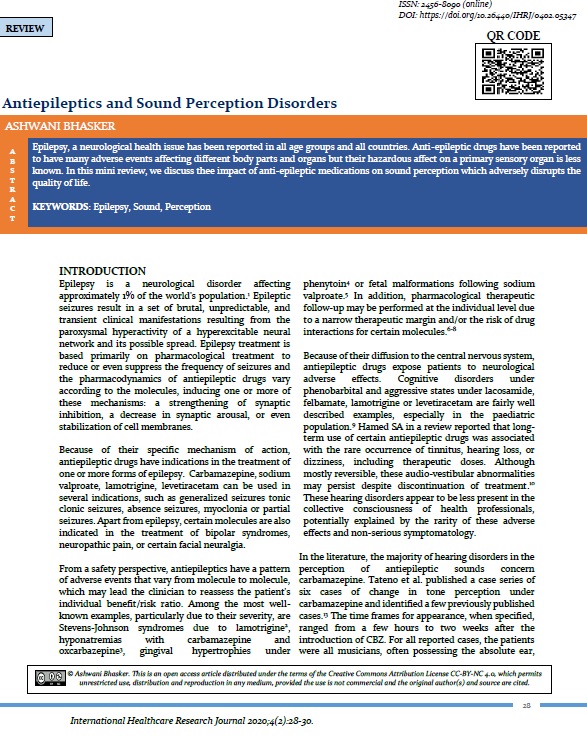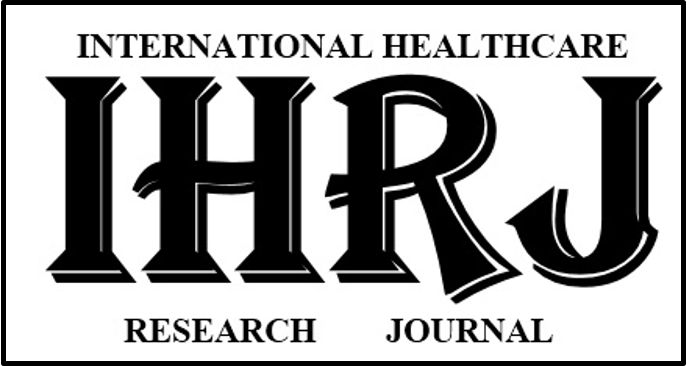Antiepileptics and Sound Perception Disorders
Abstract
Epilepsy, a neurological health issue has been reported in all age groups and all countries. Anti-epileptic drugs have been reported to have many adverse events affecting different body parts and organs but their hazardous affect on a primary sensory organ is less known. In this mini review, we discuss thee impact of anti-epileptic medications on sound perception which adversely disrupts the quality of life.
Downloads
References
2. Borrelli EP, Lee EY, Descoteaux AM, Kogut SJ, Caffrey AR. Stevens-Johnson syndrome and toxic epidermal necrolysis with antiepileptic drugs: an analysis of the US Food and Drug Administration Adverse Event Reporting System. Epilepsia 2018;59(12):2318-24.
3. Berghuis B, van der Palen J, de Haan GJ, Lindhout D, Koeleman BPC, Sander JW, et al. Carbamazepine- and oxcarbazepine- induced hyponatremia in people with epilepsy. Epilepsia 2017;58(7):1227-33.
4. Mohan RPS, Rastogi K, Bhushan R, Verma S. Phenytoin-induced gingival enlargement: a dental awakening for patients with epilepsy. BMJ Case Rep. 2013;2013.
5. Weston J, Bromley R, Jackson CF, Adab N, Clayton-Smith J, Greenhalgh J, et al. Monotherapy treatment of epilepsy in pregnancy: congenital malformation outcomes in the child. Cochrane Database Syst Rev. 2016;11:CD010224.
6. Bentué-Ferrer D, Verdier MC, Tribut O. Pharmacological therapeutic follow-up of primidone and phenobarbital. Therapie 2012;67 (4):381—90.
7. Zaccara G, Perucca E. Interactions between antiepileptic drugs, and between antiepileptic drugs and other drugs. Epileptic Disord. 2014;(4):409—31.
8. Patsalos PN, Berry DJ, Bourgeois BFD, Cloyd JC, Glauser TA, Johannessen SI, et al. Antiepileptic drugs best practice guidelines for therapeutic drug monitoring: a position paper by the sub commission on therapeutic drug monitoring, ILAE Commission on Therapeutic Strategies. Epilepsia 2008;49(7):1239-76.
9. Brodie MJ, Besag F, Ettinger AB, MulaM, Gobbi G, Comai S, et al. Epilepsy, antiepileptic drugs, and aggression: an evidence based review. Pharmacol Rev. 2016;68(3):563-602.
10. Hamed SA. The auditory and vestibular toxicities induced by antiepileptic drugs. Expert Opin Drug Saf. 2017;16(11):1281-94.
11. Tateno A, Sawada K, Takahashi I, Hujiwara Y. Carbamazepine- induced transient auditory pitch-perception deficit. Pediatr Neurol. 2006;35(2):131-4.
12. Gur-Ozmen S, Nirmalananthan N, von Oertzen TJ. Change of pitch due to carbamazepine and oxcarbazepine independently. Seizure 2013;22(2):162-3.
13. Maguire MJ. Music and epilepsy: a critical review: music and epilepsy. Epilepsia 2012;53(6):947-61.
14. Kawai M, Kanemoto K. A case of auditory disturbance caused by lacosamide. Epilepsy Behav Case Rep. 2019;11:70-2.



